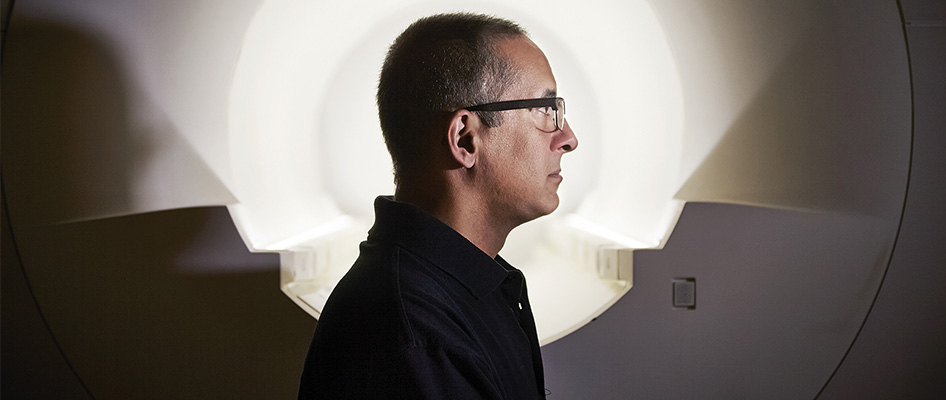Imagining a new way
Bridget Colman’s donation of $250,000 is enriching research focused on using magnetic resonance imaging for early diagnosis of multiple sclerosis
Jennifer Parraga, BA’93
Ravi Menon, PhD, hopes that in the next five years his team’s research will enable a definitive method to diagnose multiple sclerosis (MS) with the first magnetic resonance imaging (MRI) scan individuals receive.
With Canadian MS rates nine times higher than the world average and rates in Southwestern Ontario two times higher than the rest of the country, this advance has the potential to affect tens of thousands.
Western alumnus Bridget Colman, BA’90, has joined Menon in achieving this goal by making a donation of $250,000 to support his research.
Originally from Caledon, and now living in New York, Colman has a personal connection to the disease; her sister was diagnosed with MS five years ago.
At the time, Colman had already done her homework on the disease and was involved with MS research at a number of organizations in the United States and Australia. Her sister’s illness fuelled her to learn and do more.
It was a crisp fall evening, when Colman received a phone call through Western University’s phone program soliciting her for a gift as part of her 25th reunion. Colman had fond memories of her time at Western and was definitely amenable to giving. She was, however, most interested in the MS research taking place on campus.
After a series of phone calls, Colman came to learn about Menon’s work. “I was immediately impressed,” said Colman. “Ravi’s work filled an area of MS research that I thought was missing in other places. I was really drawn to the quality of his research and I wanted to see it go further.”
Working in the Centre for Functional and Metabolic Mapping at the renowned Robarts Research Institute on campus, Menon’s research is focused on early diagnosis of MS. He works with imaging tools that would allow diagnosis from the very first MRI.
This means people who have MS could be started on a treatment program almost immediately, rather than having to wait as they do now.
Menon’s close relationship with the MS Clinic, which is located next door to the Centre, was not lost on Colman, and it is something she believes strengthens the potential for this research.
Menon agrees. “We are a very tightly knit community,” he said. “Our students and coordinators go back and forth to the hospital on a daily basis. And our students go on rounds and see patients. This inspires them to continue with this work, and helps to build sustainability in our research program.”
Colman’s donation will enhance Menon’s project and ensure research results. “I’m so grateful to Bridget for this support,” said Menon. “It’s enhancing our existing funding and helping us to extend this work by three to five years, and in the end we will have completed this longitudinal study having a full cycle of people go through the process. The international impact of being able to start MS therapies months to years in advance of where we can now could halt this terrible disease in its tracks.”
For Colman, making the gift just made sense and she encourages others to really consider investing in research. “If you can do it, then do it. If you are able to provide support, then try,” she said. “This is an honourable team that is working on a project I haven’t seen taking place anywhere else, so why not support it?” she added.









